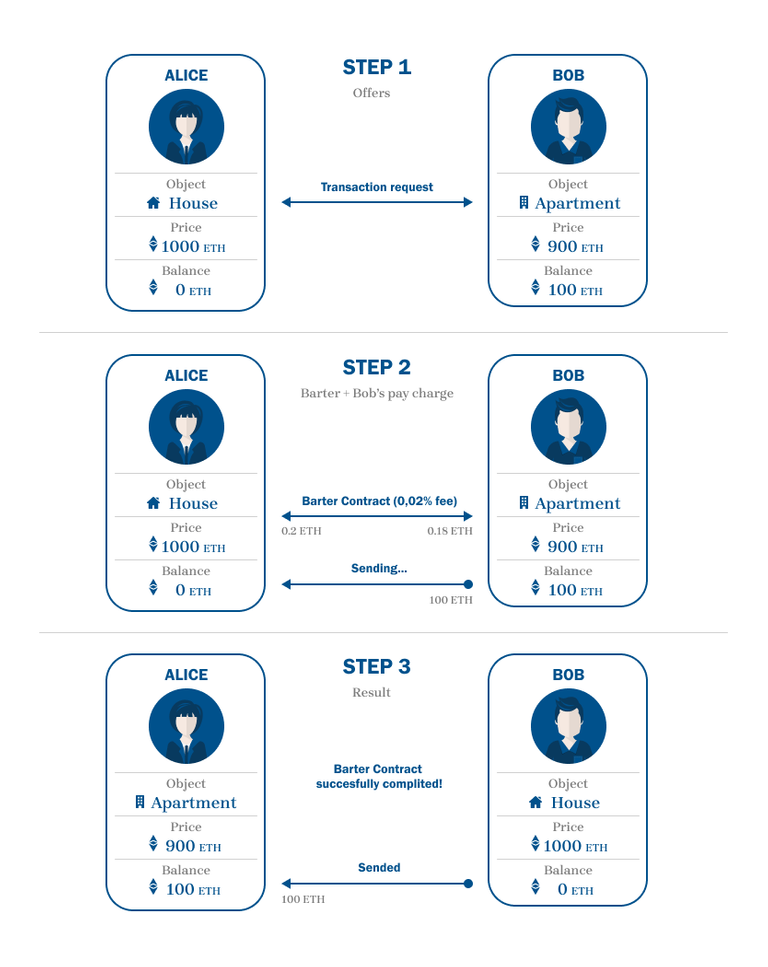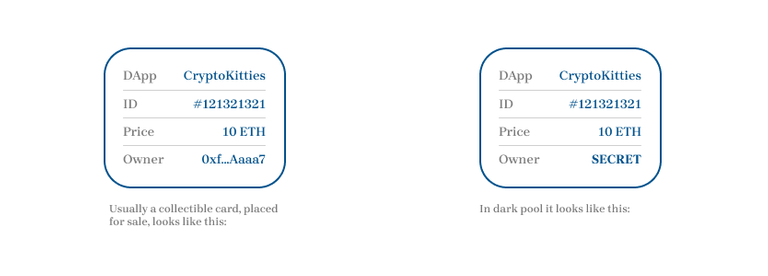
SMARTPLACE
Barter trading marketplace with support of ERC 20, 721 and 1155 tokens.
What is barter trading? It can also be called a barter protocol — a set of logical agreements for a particular type of transaction. The barter contract is applicable to the exchange of equivalent tokens or to those objects that differ in price by no more than 15%. We offer to analyze in more detail both types of transactions and show in detail how the barter exchange works.
In a barter exchange of equivalent assets (tokens), a smart contract changes the ownership of assets without using financial transactions. We expect that barter asset swaps with a slight difference in value will most often be sought. As we mentioned earlier, barter exchange is permissible between objects whose values differ by no more than 15%.
When the tokens subject to barter exchange have a difference in value, the party that has the lowest collection must pay an additional difference in value per barter contract to exchange for another more expensive collection. This difference in value is a “change” for the second party, which has a more expensive collection for exchange.
Since barter exchanges for both digital collections and for tokenized real valuable assets have the same logic, we want to explain this to you through an accessible example for everyone exchanging an apartment for a house of different values (10%).
Illustrative example:

We see that Alice and Bob executed a barter agreement for the mutual exchange of Alice’s apartment which costs 1000 ETH and Bob’s house which costs 900 ETH. As Bob has lower property value, he is obliged to pay a deficient amount, and in this example this difference is 10% or 100 ETH. It is worth noting that BRTR is used for extra charge, and ETH is indicated just for improved readability, but ETH can also be used to extra charge.
Bob can offer or confirm Alice’s barter only if he has sufficient funds to make an exchange. Suppose that Bob already has extra 100 ETH on his wallet, which are blocked during the execution of the barter agreement and are used to send Alice a “change”. The barter contract comes to execution and payment only when both parties have confirmed their intention to make an exchange using a digital signature.
Thus, as a result, we have an executed barter agreement between Alice and Bob and now the apartment belongs to Bob, and Alice has a House and 100 ETH.
As you may have guessed, smartplace is divided into:
- barter of virtual assets (collectibles);
- barter of tokenized real valuable assets.
With an additional payment, a barter contract can be concluded confidentially, which means that we remain confidential this transaction for the rest people, encrypting the fact of exchange.
Barter costs no more than 0.02% for each side, including the cost of gas Ethereum. If a dark pool is used for an exchange, then the contract value may be higher.
Dark pool? What does it mean?
Dark pool is a pool of confidential trading offers, in our case barter contracts.

As you might have noticed, the owner of an asset cannot be identified in the dark pool, he has a right to remain confidential in the trading system if it’s necessary. Therefore, there is no need to indicate the address of the collectible’s owner. In addition, this method of trading opens up great opportunities for OTC transactions costing billions of dollars both at the cryptocurrency market and at the market of real values and property.
We are working on integration of Enigma Protocol into the dark pool with the aim to encrypt the results of transactions and the identities of their participants to increase confidentiality, if necessary. We believe that the largest dealers and market makers will use the dark pool in order to prevent ways to manipulate the market. Increased confidentiality is required for large-scale barter agreements and enhances the overall security of asset owners.
Barter: a smartplace in the real economy.
The broadest research and important element of our ecosystem is the use of smart contracts in the legal field. We are creating an automated legal barter exchange of the international level, combining the traditional economy with decentralized finances. We rely on the legal exchange agreement for the legality of smart contracts and their using in the real world.
Why barter exchange?
Barter exchange is very convenient to use if the objects of exchange are equivalent in value. The advantage of barter exchanges of equivalent objects is that only a change of the owner’s rights to the asset / object is required for legal transfer / exchange, without using financial transactions. Thus, applying a barter contract, the exchange of ownership rights to these assets in property registers is performed.
Barter exchange is also applicable when the objects are unequal, but have a close value, for example, a difference is just 10–15%. Here, barter exchange also has an advantage — for barter exchange of unequal goods it is enough to use only one financial transaction — to pay this difference. A barter contract is cheaper, faster, and safer.
For barter exchange of real valuable assets, preliminary tokenization is required, which will allow you to create a virtual token equal to the value of your item, indicating your name as the owner, if a public token is created. After the virtual copy is created — you can place this token on the smartplace, including the auction method of trading, wait for counter offers or send your offers for barter exchange to other participants.
We understand that for some of you who have just begun to get acquainted with the world of cryptocurrencies and blockchain, some words may seem unfamiliar or not clear, so feel free to ask any questions in the comments to our articles here and in our Telegram chat.
You can learn what is the tokenization of a real valuable asset and auction trading in the following articles that we will devote to the use of the BRTR token and the benefits to get BRTR tokens.
Recall that now the project is at the stage of pre-sale of tokens, the proceeds from the sale of which are invested in the development of the Barter project
We accept ETH and BTC to official wallets:
Ethereum — 0x17d3d1da06688bc61592913921414bff09bc570c;
Bitcoin — 17BexJeUQfM1iQqtgoAaqgBLPdRvKZUTR1.
BRTR tokens will be credited to each participant when the wallet is launched.